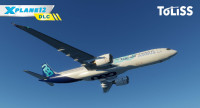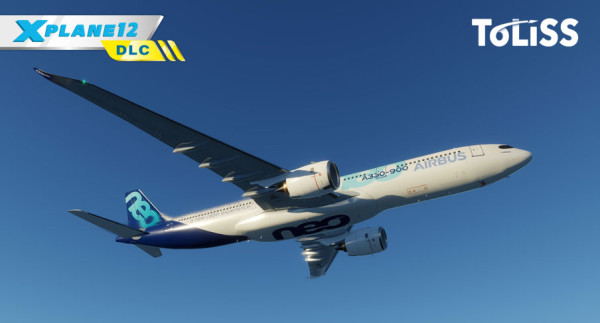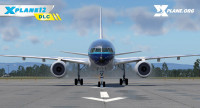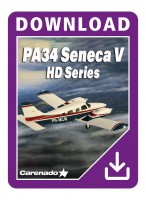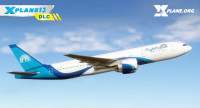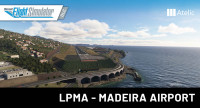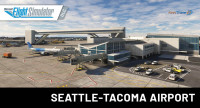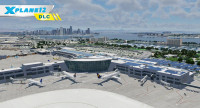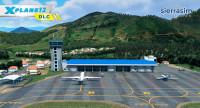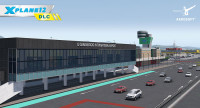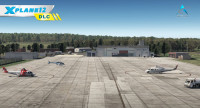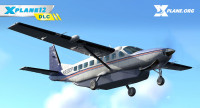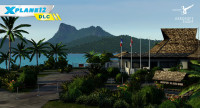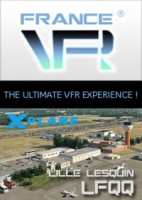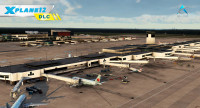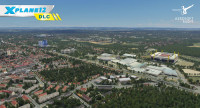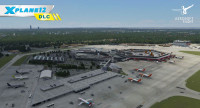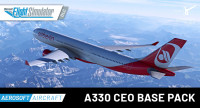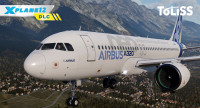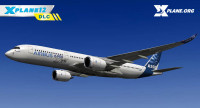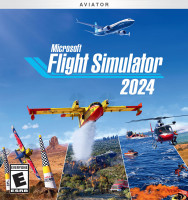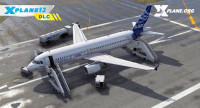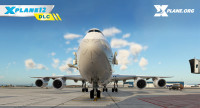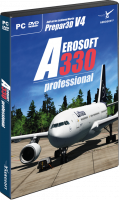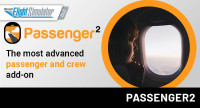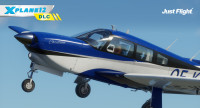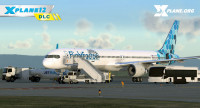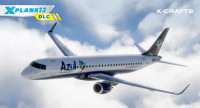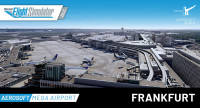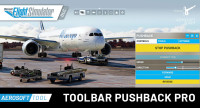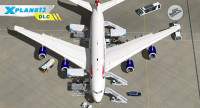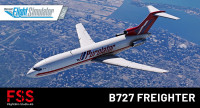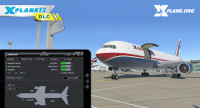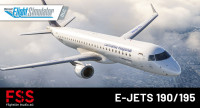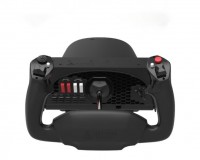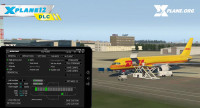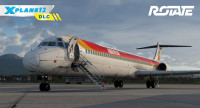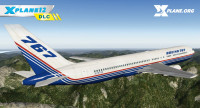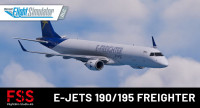Price incl. 20% VAT
Available as instant download
- Article number: AS16454
- Manufact./Publisher: ToLiss
- Current version: 1.0.3
Officially licensed by Airbus
Most accurate system functionality for any A330 aircraft in the flight simulation world.
A330-900 Specific Features
- HUD (only for XP12) – Head up display on both the pilot and co-pilot sides providing all relevant flight information in the pilot’s field of view during all flight phases
- DRAIMS - Digital Radio and Audio Integrating Management System providing easier management of radio frequencies, transponder settings as well as backup radio navigation
- ATSAW - Airborne Traffic Situation Awareness showing detailed information about surrounding traffic on the Navigation Display (ND)
- ROW/ROPS - Runway overrun warning & Runway Overrun Prevention System alerting the crew if the available runway length becomes insufficient for a safe landing
- TOS - take off surveillance alerting the crew if it attempts taking off from a taxiway or a runway different than selected in the FMS
- ISCS is now available in the EFB also, but can also be used in a separate window
Detailed FMGS
- 3 independent MCDUs providing real life FMGS programming capability
- 2 independent autopilots
- SID/STAR and airways support in a fully custom FMGS backbone supporting all A424 leg types (Arc, course or heading to intercept, Radius to Fix, Holdings, etc.)
- Support for all approach types present in real life A330-900s, including GLS, ILS, SLS, FLS, LOC backcourse, etc.
- Full VNAV guidance with TOC, TOD, Deceleration point, speed limits, fuel prediction, etc.
- Altitude and speed constraints as the real aircraft deals with them
- Support for Go-Arounds and diversions
- Nav Aid autotuning
- Pilot item database, such as pilot fixes, pilot navaids etc.
- Flight plan saving via the Pilot routes page
- Equitime point computation and nearest airports page
Accurate Systems
- Fly-by-wire system with reversion between normal law and alternate law 1, alternate law 2 and direct law as per real life logics.
- Hydraulic model for flight control actuators computing hydraulic flow through the actuators, the control surface hinge moment, maximum feasible deflection etc. This gives realistic surface floating angles if a control surface is lost due to combinations of hydraulic and computer faults.
- Quantitative hydraulic model considering the maximum hydraulic flows of the different pumps as a function of engine speed. This is most noticeable when flying on RAT or with wind milling engines
- Quantitative bleed model considering the bleed mass flow for engine start, wing anti-ice air conditioning packs etc.
- High fidelity fuel system including inflight CG control by pumping fuel to and from the tail tank, fuel jettison, manual and automatic transfers between the different tanks
- Detailled model of each ADIRU including alignment, small pressure sensor differences between the units, switching of sources for PFDs and autopilot inputs
- Fault injection system allowing to trigger over 250 system faults either at a specific point in flight or randomly during a flight phase
- Cockpit display system simulating the dependency of the displays on the Display management computers resulting in real life display limitations
- ECAM system with over 30 warning and over 200 caution messages including associated ECAM actions.
- Backup Speed Scale (BUSS) to provide an estimated speed based on Angle of Attack data and an estimated altitude based on GPS data.
3D Modelling
- Detailed 3d cockpit with animated switches
- Mouse gesture system for interaction with push-pull knobs emulating the motion on the knob with the mouse
- Detailed cockpit lighting with reading lights, console light, tray table lights etc.
- 2 class passenger cabin
- Custom particle effects for engine heat trail, Fuel jettison etc.
- Custom landing gear model for bogey touch down.
- Animated tray tables, HUD, cockpit window, cockpit seats, front window shades
Usability Features
- Situation loading and saving. It is possible to save the flight at any point in time and resume it another day. This can also be used, e.g., to save the position just before approach and practice just the approach many times
- Autosaving allows recovering where you left off, should the X-Plane session end unexpectedly
- Jumping waypoint-to-waypoint through the cruise phase: Shorten your flight to focus on the more interesting parts as you like
- 4 different startup configurations from Cold and Dark to engines running and ready to go
- Ability to set each of the startup configurations at the click of a button without reloading the aircraft.
- In-screen popup displays or use of x-plane windows for popups
- Adjustable Wingflex via a slider in the ISCS
- Adjustable sounds via a slider in the ISCS
- Possibility to turn the screen reflections on and off
- Auto-updater by Skunkcraft Included
Aircraft Review by X-Plained.com:
"As I expected already, the review has become a bit longer than expected. That is also the reason to split it. [..] Now that part 1 of the ToLiss A330-900 review is finished, I can only say that it is an exceptional Airbus creation with many improvements over all previous models, and the A330-900 comes with a lot of new features. For sure, the ToLiss team will, whenever applicable, implement these new features and improvements in their previous Airbus models … I hope.
[..] Enjoy the review while I continue with part 2, which will cover a complete flight using the tutorial as a guideline."
Read complete Part I - Introducing
"Wow, part 2 of the Toliss A330-900 review has lasted longer than expected. On the other hand, it was a good decision to split the review. While flying from A to B, I could focus entirely on the aircraft and the modelled systems. [..]
If you don’t like the smaller Airbus A320 family members or the A340-600 is too big for you, then this A330-900 is the perfect aircraft. [..] The A330-900 is, like all the other ToLiss Airbus models, a masterpiece. It flies as real as it gets. I challenge you to disconnect the AP and try flying the A330-900 yourself. When you feel confident, do the same during the descent or even the approach. The way it feels is the way a real Airbus flies."
- X-Plane 12 / X-Plane 11
- Windows, Linux or Mac (requires use of Rosetta on M1/M2 Macs with XP12)
- CPU: i5 or i7 4th generation or newer (or AMD equivalent)
- Graphics card: GTX 950 or higher (or Radeon equivalent)
- VRAM: 4 GB or more
VERSION 1.0.3 (Build 1625)
Bug fixes:
- Reenabled auto FD engagement on FCU power up
- Removed the continuous ding with the No portable electronic devices in the AUTO position
- Reduced Flight director sensitivity in pitch
VERSION 1.0.2 (Build 1624)
New features:
- JAR ground handling set included in the official package
- Added a Satcom model that can be enabled via the livery config file
- Added details to the landing gear, such as hydraulic lines or decals
Bug fixes:
- Reenabled APU start on battery only
- Prevented DC1 and DC2 busses to be powered in battery only configuration
- Fixed a bug that the FMGS stayed in managed mode after landing
- Fixed a bug that the Landing System Type "LOC" was displayed in PFD when there is no landing system tuned
- Further improvements to the landing gear bogey angle model to make sure the front wheels touch when they are supposed to
- Increased wing flex intensity
- Fixed an issue that the FMGS would not maintain green dot speed in managed mode, if green dot > 215kts
- Ensured that the state of the "No portable electronic devices" sign in the cabin matches that indicated on the ECAM
- Fixed the nose wheel light logic
- Improved the flight director roll scale
- Fixed a bug with the weather radar in XP11
- Removed the "continuous ignition" for the engines, as the Trent 7000 does not have this
- Aircraft now initializes with the pitch trim angle of 4 degrees, which is the THS angle automatically selected after landing
VERSION 1.0.1 (Build 1621)
Artwork tuning:
- Rebalanced engine volumes inside and outside (increase inside volume, decrease outside volume)
- Retuned the "light enhancement" to make sure it does not interfere with night lighting
- Removed artefacts from panel text bitmaps and forced texts to be high resolution always
- Cockpit texture rework: Color rebalancing, reduction of some "unpopular" effects, addition of custom shadows for depth
- Made the landing gear tires smoother
- Increase sunshade size to be able to read a lot of the HUD in bright sun
Bug fixes:
- Removed the erroneous click spots above the clock
- Fixed a bug preventing the entry of an ILS frequency in cruise
- Corrected the VLS offset for speed brake deployment
- Fixed the beacon light glass lighting up at night when it shouldn't
- Fixed an issue causing the ISCS in EFB to crash under certain conditions
- Fixed issue with APU start delay after landing
- Fixed issue with forward Main gear tilted too high
- Reduced the risk of engine overheat at high cruise altitudes
- Fixed an issue with thrust reverser grid penetrating the right engine cowling
- Fixed the GS calculation for FLS-G/S
- Changed the manipulators for the Speed brake lever such that you cannot accidentally extend the speed brake anymore when disarming
- Fixed a cabin temperature regulation bug affecting the rear section of the cabin
- Switched off the clock display if aircraft is on ground and DC ESS not powered
- Enabled autofill of the first 1 for the frequency on DRAIMS
- Enabled changing TCAS modes while transponder is in STBY
- Improved display of the ATC page
- Fixed issues with the flap load relief function
- Prevented HUD from drawing the horizon line into the DRAIMs
- Corrected the position of the strake at the bottom of the aft fuselage
- Fixed the misalignment between jettison nozzle and jettison particle effect
- Eco seats texture fix
- Added missing cabin placard
- Increased manipulator size for switch requiring dragging or scroll wheel as applicable
- Made the traffic selector knobs work with FCU gesture system turned off


